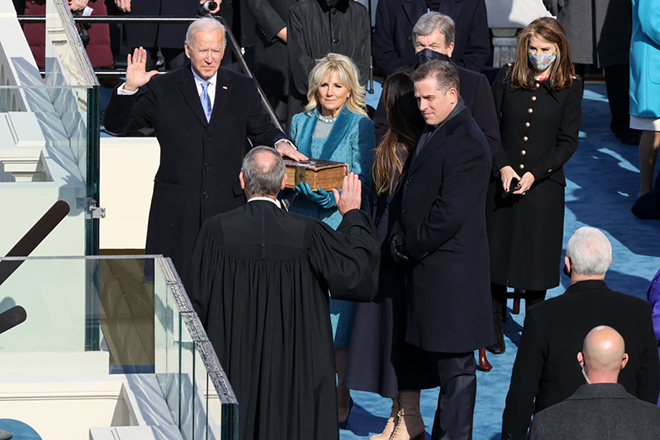S&P Global Offerings
Featured Topics
Featured Products
Events
S&P Global Offerings
Featured Topics
Featured Products
Events
S&P Global Offerings
Featured Topics
Featured Products
Events
Banking & Capital Markets
Economy & Finance
Energy Transition & Sustainability
Technology & Innovation
Podcasts & Newsletters
Banking & Capital Markets
Economy & Finance
Energy Transition & Sustainability
Technology & Innovation
Podcasts & Newsletters
S&P Global Offerings
Featured Topics
Featured Products
Events
20 Jan, 2021
By Donna Young

|
President Joe Biden being sworn in Jan. 20 by U.S. Supreme Court Justice John Roberts |
President Joe Biden is reengaging with the World Health Organization and has called on top U.S. infectious diseases expert Anthony Fauci to represent the nation and deliver an address on Jan. 21 at the UN's group's executive meeting.
Biden also plans to have the U.S. join the WHO-led public-private global partnership to accelerate the development and delivery of COVID-19 vaccines to all nations, particularly low-income countries.
The newly sworn-in president said he will cease the Trump administration's process of withdrawing from the WHO — an entity the new occupants of the White House called "critical to coordinating the international response to COVID-19, advancing preparedness for future epidemics and pandemics and improving the health of all people."
The new administration said it plans to work with the WHO and its global partners to strengthen and reform the organization, support the COVID-19 health and humanitarian response and advance global health and health security.
In April 2020, former President Donald Trump put a hold on U.S. funds to WHO because he said the group was "too China-centric."
Trump blamed China for the spread of COVID-19 throughout the world. The virus is thought to have started in Wuhan, China, where the first cases were identified in December 2019. The U.S. Centers for Disease Control and Prevention revealed Jan. 21, 2020, that the first case of COVID-19 had been diagnosed in the U.S. in a Washington state man who had traveled to Wuhan.
Now, over 400,000 Americans have died of the disease.
In late May 2020, Trump said he would cut ties with the WHO, and on July 7, 2020, his administration officially notified Congress and the United Nations that the U.S. planned to withdraw from the global health group July 6, 2021 — an action that was widely criticized and called illegal.
The U.S. contributes about $500 million per year to the WHO, which has an annual budget of about $5 billion.
"America's withdrawal from the international arena has impeded progress on the global response and left us more vulnerable to future pandemics," Jeff Zients, Biden's COVID-19 response coordinator, told reporters Jan. 19.
Anthony Blinken, Biden's nominee to lead the U.S. Department of State, revealed during his Jan. 19 Senate confirmation hearing the new administration would also join the COVAX partnership — a collaboration of over 90 nations that was shunned by the Trump administration.
"We believe strongly that we can ensure that every American gets the vaccine but also help make sure that others around the world who want it have access to it," Blinken told the Senate Foreign Relations Committee. "We are committed to making sure that, to the best of our ability, the vaccine is distributed properly and equitably."
During his Jan. 20 inaugural address, Biden called on Americans and lawmakers to "set aside the politics and finally face this pandemic as one nation."
"The world is watching today," Biden said. "America has been tested and we have come out stronger for it. We will repair our alliances and engage with the world once again. Not to meet yesterday's challenges but today's and tomorrow's. We will lead not merely by the example of our power but by the power of our example."
Acting health chiefs revealed
Also on Jan. 20, the White House revealed that Norris Cochran would be leading the U.S. Department of Health and Human Services while Biden's pick to head the agency, Xavier Becerra, goes through the confirmation process.
Like other Trump political appointees, Alex Azar's tenure as HHS chief ended at noon ET on Jan. 20. Biden also called on Trump's surgeon general, Jerome Adams, to step down Jan. 20.
Cochran had been serving as the deputy assistant secretary of budget at HHS during the Trump administration.
Elizabeth Richter will serve as acting administrator for the U.S. Centers for Medicare and Medicaid Services, replacing Trump's outgoing chief Seema Verma.
Nikki Bratcher-Bowman will become acting assistant secretary for preparedness and response at HHS for Biden, replacing Trump's political appointee Robert Kadlec, whose public role in pandemic response was limited even though his office is charged with leading the nation's medical and public health preparedness, response and recovery from disasters and public health emergencies.
The White House also confirmed that Janet Woodcock is the acting commissioner of the U.S. Food and Drug Administration until Biden's yet-to-be-named choice is confirmed.
Woodcock was the longtime director of the FDA's Center for Drug Evaluation and Research but stepped aside in May 2020 to serve as therapeutics lead for the Trump administration's Operation Warp Speed — a project Biden plans to rename and overhaul.
Woodcock was most recently named the principal medical adviser at FDA.
"It is an honor and privilege to serve as acting FDA commissioner," Woodcock tweeted Jan. 20. "The FDA's public health work is more critical than ever as we continue to fight this global pandemic."
"I commit to you to do everything I can to keep FDA employees safe and productive and to support the regulatory programs we are entrusted with," Woodcock said in a memo to FDA staff.
The past year has been "very tough" and "we have a challenging road ahead," she said.
"Dr. Woodcock has been a pivotal figure at the FDA for decades and there is no one better qualified than her to direct the agency at this crucial time," Friends of Cancer Research Chair and founder Ellen Sigal said in a Jan. 20 statement.
